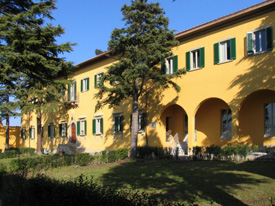A Few Facts

- Many programs involve little additional cost: financial aid often applies.
- You can study in English in most disciplines at many overseas universities.
- Universities abroad offer exciting new courses not available at Hendrix.
- Experience abroad improves graduate school and career prospects, and looks great on an application or resume.
- Living overseas increases self-confidence and global awareness.
- Great opportunities for learning outside the classroom are guaranteed.
- Your undergraduate years are your very best opportunity for going abroad.
- Most study abroad participants view their time overseas as the most significant and exciting experience of their college years.
Choosing a Study Abroad Program
Here are some questions you need to ponder as you make plans to study abroad:
- What type of experience would best suit me?
- WHY would a learning experience abroad be beneficial to me?
- WHAT would I like to study while abroad?
- HOW will study abroad fit into my degree program here?
- WHERE would I like to go?
- WHEN can I go?
- HOW LONG can I go for?
- HOW will I finance the experience?
- Where can I get the facts required to make informed choices?
Seek out information on your own: your best starting place for information is at the Study Abroad Library, located in Buhler Hall. You can also find lots of terrific, detailed information on study abroad on the web.
Feel free to contact the Study Abroad Office by e-mail at studyabroad@hendrix.edu with any questions you may have about Hendrix College study abroad opportunities!
Evaluating a Non-Hendrix Study Abroad Program
A few questions to consider when choosing a non-Hendrix program:
- Has the program been in existence for a reasonable length of time? Is it known to other students, faculty members or administrators?
- Is the program with an accredited institution? Does the sponsoring school help you transfer credit?
- Is the application process rigorous (e.g. are personal statements, letters of recommendation, language proficiency evaluations, and other related documents required?)?
- Is there an orientation session prior to departure or on-site?
- Are inquiries to the sponsoring institution handled in a timely and professional manner?
- What specific items does the program fee cover? How expensive will items not covered be?
- How is financial aid handled? Are any scholarships available?
- Are conditions for refunds and possible adjustments due to currency fluctuations clearly spelled out?
- What are the typical housing arrangements? Do you have a variety of options? Will your quarters foster contact with the local populace?
- How clear and detailed are the course descriptions? Are there any indications of who will be teaching them?
- How does the program's curriculum benefit from the host environment?
- Are there ample opportunities for non-classroom learning experiences (e.g. field trips, work projects, family stays, etc.)?
- Does the study site offer significant cultural opportunities?